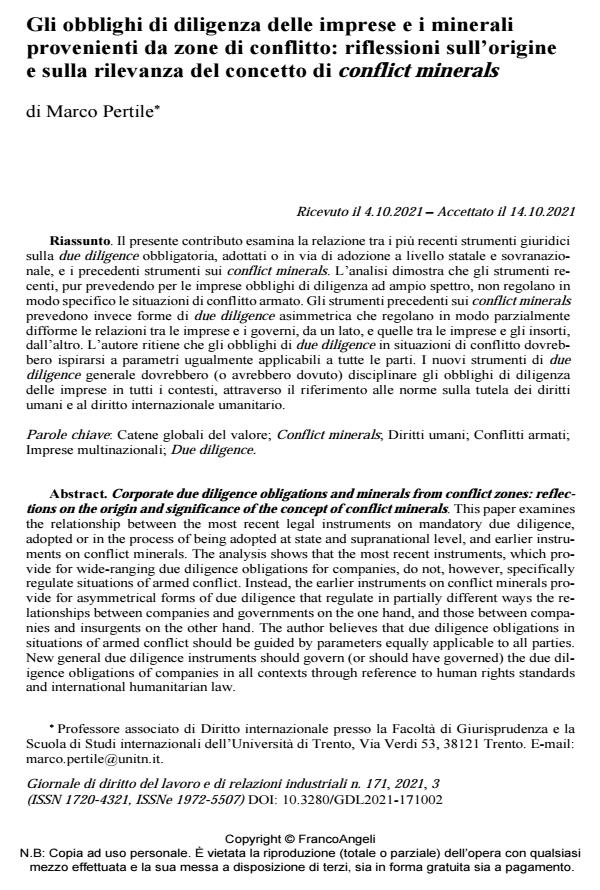Corporate due diligence obligations and minerals from conflict zones: reflections on the origin and significance of the concept of conflict minerals
Journal title GIORNALE DI DIRITTO DEL LAVORO E DI RELAZIONI INDUSTRIALI
Author/s Marco Pertile
Publishing Year 2021 Issue 2021/171
Language Italian Pages 30 P. 391-420 File size 355 KB
DOI 10.3280/GDL2021-171002
DOI is like a bar code for intellectual property: to have more infomation
click here
Below, you can see the article first page
If you want to buy this article in PDF format, you can do it, following the instructions to buy download credits

FrancoAngeli is member of Publishers International Linking Association, Inc (PILA), a not-for-profit association which run the CrossRef service enabling links to and from online scholarly content.
This paper examines the relationship between the most recent legal instruments on mandatory due diligence, adopted or in the process of being adopted at state and supranational level, and earlier instruments on conflict minerals. The analysis shows that the most recent instruments, which provide for wide-ranging due diligence obligations for companies, do not, however, specifically regulate situations of armed conflict. Instead, the earlier instruments on conflict minerals provide for asymmetrical forms of due diligence that regulate in partially different ways the relationships between companies and governments on the one hand, and those between companies and insurgents on the other hand. The author believes that due diligence obligations in situations of armed conflict should be guided by parameters equally applicable to all parties. New general due diligence instruments should govern (or should have governed) the due diligence obligations of companies in all contexts through reference to human rights standards and international humanitarian law.
Keywords: Global value chains; Conflict minerals; Human Rights; Armed Conflicts; Multinational corporations; Due diligence.
- Il problema dell'essere umano nel diritto Hugo Sinzheimer, in GIORNALE DI DIRITTO DEL LAVORO E DI RELAZIONI INDUSTRIALI 173/2022 pp.39
DOI: 10.3280/GDL2022-173002 - Lieferkettensorgfaltspflichtengesetz: perché è nata e quali sono i suoi principali contenuti Luca Nogler, in GIORNALE DI DIRITTO DEL LAVORO E DI RELAZIONI INDUSTRIALI 173/2022 pp.1
DOI: 10.3280/GDL2022-173001 - Take Due Diligence Seriously: commento alla direttiva 2024/1760 Fausta Guarriello, in GIORNALE DI DIRITTO DEL LAVORO E DI RELAZIONI INDUSTRIALI 183/2024 pp.245
DOI: 10.3280/GDL2024-183001
Marco Pertile, Gli obblighi di diligenza delle imprese e i minerali provenienti da zone di conflitto: riflessioni sull’origine e sulla rilevanza del concetto di conflict minerals in "GIORNALE DI DIRITTO DEL LAVORO E DI RELAZIONI INDUSTRIALI " 171/2021, pp 391-420, DOI: 10.3280/GDL2021-171002